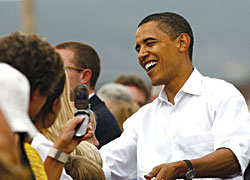 |
They gained modestly in the Islamic world where people are still suspicious of Washington.
The survey was based on interviews with more than 26,000 respondents in 24 nations and the Palestinian Territories
last month.
Andrew Kohut, who has directed all eight surveys GAP has published since 2000, attributed the improvement in Washington's standing primarily to Obama's popularity.
Israel was the only country where people didn't express significantly more confidence that Obama "will do the right thing in world affairs" than they had said about Bush one year ago when GAP published its last survey.
The difference was particularly pronounced in Western Europe where nine of 10 French and German respondent said they believed Obama will do the right thing, compared to only 13 or 14 per cent who thought similarly about Bush in 2008.
Strong pluralities or solid and even overwhelming majorities in each country (except the US itself) agreed with his decision to close the Guantanamo detention facility and to withdraw US troops from Iraq by December 2011.
At the same time, strong pluralities and majorities in all but a handful of countries - Israel, India, Kenya, and Nigeria - opposed his decision to send more US troops to Afghanistan.
Nonetheless, US anti-terrorism efforts are now seen more positively abroad than they were during the last years of the Bush administration. While majorities in only five countries said they favoured US-led efforts against terrorism in 2007, majorities in 15 said they favoured them in 2009.
More respondents also see US policy as less unilateral under Obama, such as Germany, where the number of respondents who said they believed that Washington considers their country's interest in its foreign policy jumped from 27 per cent in 2007 to 54 per cent in 2009, and Russia where the number rose from 19 to 31 per cent.
In several key countries - Brazil, Indonesia, Mexico, India, Argentina, Nigeria, and Turkey - significantly more respondents considered the US a "partner" rather than an "enemy"
For all that, scepticism about US policy, even under Obama, remains high.
With the notable exceptions of Germany, China, India, Israel, Brazil, Kenya, and Nigeria, firm majorities ranging as high as 84 per cent (Jordan) believe Washington is not currently adhering to multilateral policies.
In all but five countries - France, India, South Korea, Kenya and Nigeria - more respondents said they see the US as exercising a more negative than positive influence on their countries than the reverse.
Despite some modest improvements, Washington's status remains particularly problematic in the Arab, the Middle East and the larger Islamic world, according to the survey.
Majorities in all seven predominantly Muslim countries with the exception of Jordan (48 per cent), said they were concerned that the US could become a military threat to their country, although that impression has diminished in four countries, especially in Turkey, Jordan, and Egypt, compared to a year ago. At the same time, it increased in Pakistan from 72 per cent to 79 per cent.
Skepticism was also especially strong on the question of whether Obama would be fair in dealing with the Israeli-Palestinian conflict. While pluralities or majorities in every country answered in the affirmative, all of the predominantly Muslim countries - except Indonesia - and Russia disagreed.
Overall, the percentage of respondents in every predominantly Muslim country who expressed favourable views of the US. rose - albeit relatively modestly - compared to a year ago. The only exception was Pakistan, where positive assessments fell from 17 per cent to 15 per cent.
(IPS)


